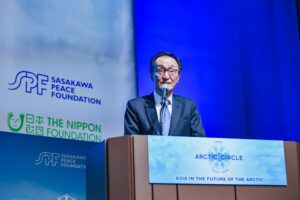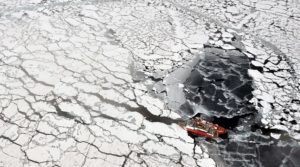Japan’s first official document on Arctic initiatives took the form of a Basic Plan on Ocean Policy, adopted in 2013. It outlined three focus areas to be pursued strategically and comprehensively: (1) observation of and research on the Arctic from a global perspective; (2) international cooperation on the Arctic; and (3) examination of the feasibility of the Northern Sea Route.
Japan released its official Arctic Policy in October 2015 as a follow-up to this document with more specific measures and defined policy. Its aim is to position Japan as an important player in the Arctic that proactively contributes to peace in the region. It focuses on strategic initiatives in diplomacy, national security, environment, transportation, resource development, information and communications, science, and technology. It sets out a number of broad actions the country intends to take in the years to come, including: emphasizing respect for the rule of law, making full use of Japan’s strength in science and technology to address climate change, exploring economic opportunities for Arctic shipping, and respecting the rights of indigenous peoples.
Japan intends to complete their list of broad actions through three specific initiatives that focus on a particular type of Arctic diplomatic engagement. Each of these initiatives is detailed at length in their policy document, complete with actionable items and steps to achieving them. Japan’s Arctic initiatives include (1) Research and Development; (2) International Cooperation; and (3) Sustainable Use.
The policy was created by the civil service, politicians, think tanks, independent agencies, and business interests—and is ultimately reflective of their diverse set of interests. Many entities within the government were also involved in the creation of the policy, including the Ministries of Foreign Affairs, Land Infrastructure, Transport, Tourism, Education, Culture, Sports, Science, Technology, and Defense.
Beyond its official domestic Arctic Policy, Japan is deeply engaged in international and intergovernmental cooperation in the High Horth. It has been an Arctic Council observer state since 2013, and appointed Masuo Nishibayashi as Ambassador to the Arctic in March 2013. Japan’s current Ambassador to the Arctic is International Northern Sea Route Program. Japan actively engages in international cooperation through scientific research on the Arctic and Arctic climate change, and is an active member of a number of Arctic organizations such as the International Arctic Science Committee. Of particular interest to Japan are the effects of Arctic climate changes on extreme weather events in Japan. Bilaterally, Japan actively engages with all Arctic states, although ties with Russia, the United States, and Norway are strongest.
Recently, Japan has been more interested in emphasizing and building on past achievements while allowing other countries to take the lead in pioneering change in the Arctic. Ultimately Japan is interested in the Arctic for its energy resources and shipping routes, but has shown a commitment to regional diplomacy and active political engagement in the region.
Japan’s Arctic Policy also highlights the leading role of Japan in formulating several international environmental agreements such as the Kyoto Protocol, Aichi biodiversity targets and other agreements through which the international community has responded to global environmental problems such as global warming and the loss of biodiversity. The Policy also outlines the need to contribute to Arctic sustainable development in a way that benefits Indigenous peoples in the region. In 2015, the Japanese government started to finance the Arctic Challenge for Sustainability Project (ArCS) as a means to promote Arctic scientific research and to contribute to policy decision making and problem solving between 2015 and 2020. Often described as Japan’s flagship program for Arctic research, ArCS is funded by MEXT with the National Institute of Polar Research (NIPR), Japan Agency for Marine-Earth Science and Technology (JAMSTEC) and Hokkaido University all playing key roles in further developing the project and cooperating with other related Japanese institutions on Arctic research. The ArCS project was renewed in 2020 for another period of five years: ArCS II (2020 – 2025).


